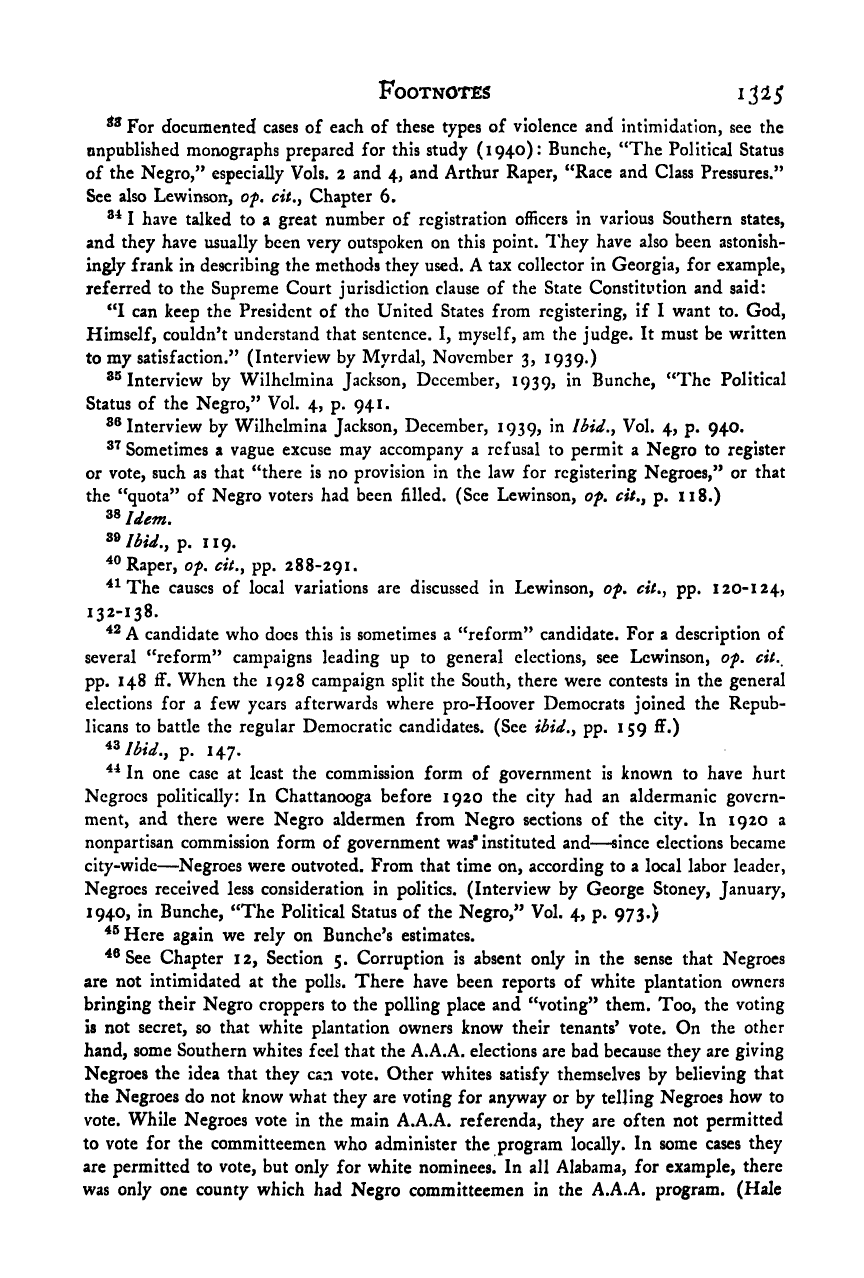Note: Gunnar Myrdal died in 1987, less than 70 years ago. Therefore, this work is protected by copyright, restricting your legal rights to reproduce it. However, you are welcome to view it on screen, as you do now. Read more about copyright.
Full resolution (TIFF) - On this page / på denna sida - Footnotes - Chapter 22

<< prev. page << föreg. sida << >> nästa sida >> next page >>
Below is the raw OCR text
from the above scanned image.
Do you see an error? Proofread the page now!
Här nedan syns maskintolkade texten från faksimilbilden ovan.
Ser du något fel? Korrekturläs sidan nu!
This page has never been proofread. / Denna sida har aldrig korrekturlästs.
Footnotes
** For docamented cases of each of these types of violence and intimidation, see the
nnpublished monographs prepared for this study (1940): Bunche, “The Political Status
of the Negro,’’ especially Vols. 2 and 4, and Arthur Raper, “Race and Class Pressures.”
See also Lewinson, of, cit,y Chapter 6.
I have talked to a great number of registration officers in various Southern states,
and they have usually been very outspoken on this point. I’hey have also been astonish-
ingly frank in describing the methods they used. A tax collector in Georgia, for example,
referred to the Supreme Court jurisdiction clause of the State Constitution and said:
“I can keep the President of the United States from registering, if I want to. God,
Himself, couldn’t understand that sentence. I, myself, am the judge. It must be written
to my satisfaction.” (Interview by Myrdal, November 3, 1939.)
Interview by Wilhelmina Jackson, December, 1939, in Bunche, “The Political
Status of the Negro,” Vol. 4, p. 941.
Interview by Wilhelmina Jackson, December, 1939, in Ibid.y Vol. 4, p. 940.
Sometimes a vague excuse may accompany a refusal to permit a Negro to register
or vote, such as that “there is no provision in the law for registering Negroes,” or that
the “quota” of Negro voters had been filled. (See Lewinson, of, cit,y p. 118.)
38 Idem,
Ibid, p. 1 1 9.
Raper, of, cit,y pp. 288-291.
The causes of local variations are discussed in Lewinson, of, cit,y pp. 1 20- 1 24,
132-138.
A candidate who docs this is sometimes a “reform” candidate. For a description of
several “reform” campaigns leading up to general elections, see Lewinson, of, cit,
pp. 148 If. When the 1928 campaign split the South, there were contests in the general
elections for a few years afterwards where pro-Hoover Democrats joined the Repub-
licans to battle the regular Democratic candidates. (See ibid,y pp. 1 59 ff.)
Ibid,y p. 147.
In one case at least the commission form of government is known to have hurt
Negroes politically: In Chattanooga before 1920 the city had an aldermanic govern-
ment, and there were Negro aldermen from Negro sections of the city. In 1920 a
nonpartisan commission form of government was* instituted and—since elections became
city-wide—Negroes were outvoted. From that time on, according to a local labor leader,
Negroes received less consideration in politics. (Interview by George Stoney, January,
1940, in Bunche, “The Political Status of the Negro,” Vol. 4, p. 973.)
^®Here again we rely on Bunche’s estimates.
**8
See Chapter 12, Section 5. Corruption is absent only in the sense that Negroes
are not intimidated at the polls. There have been reports of white plantation owners
bringing their Negro croppers to the polling place and “voting” them. Too, the voting
is not secret, so that white plantation owners know their tenants’ vote. On the other
hand, some Southern whites feel that the A.A.A. elections are bad because they are giving
Negroes the idea that they can vote. Other whites satisfy themselves by believing that
the Negroes do not know what they are voting for anyway or by telling Negroes how to
vote. While Negroes vote in the main A.A.A. referenda, they are often not permitted
to vote for the committeemen who administer the program locally. In some cases they
are permitted to vote, but only for white nominees. In all Alabama, for example, there
was only one county which had Negro committeemen in the A.A.A. program. (Hale
<< prev. page << föreg. sida << >> nästa sida >> next page >>